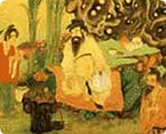Everything About Tofu History Of Tofu

Legends have it that long ago (say about 5000 years ago) there was an Chinese Emperor called Shen Nung who taught agriculture to the Chinese people and recorded all his agricultural trials and crop experiments for posterity. There was a myth that he had a transparent stomach in which he could observe the various plants he had ingested, and study their effects on his body. There are also myths that he was poisoned, and miraculously recovered, many times in his dedication to find new plants suitable for cultivation as food crops. Soybeans were mentioned in these records.
In an early book on Chinese medicines (本草), it was recorded that well before the Han Dynasty, (206 B.C. - 200 A.D.) soybeans were cultivated as a food crop.
Historians accept that by the 2nd century B.C. processed soybeans food were commonly available to the people. There are many legends and conflicting claims regarding the beginnings of tofu. One source has it that the process of making tofu was discovered by a man named Liu An of Huai-Nan.
By the Tang Dynasty (618-907 A.D.), written records showed that tofu and its derived food products were sold and eaten as meat substitutes. It was postulated that a possible reason why tofu was not mentioned in earlier records could be that as it was considered food for the poor it was not worth mentioning in official records.
For many centuries tofu remained the food of poor people relative of all foods. It finally received the respect it deserved only in the 17th century. As the story goes, Qing Emperor Kang Xi (1662-1722) discovered its wonders when he ventured out incognito among the people in Suzhou in Jiangsu Province. When he returned to Beijing he ordered his chefs to start preparing tofu based food for him. Overnight the humble bean curd became a noble fare.
